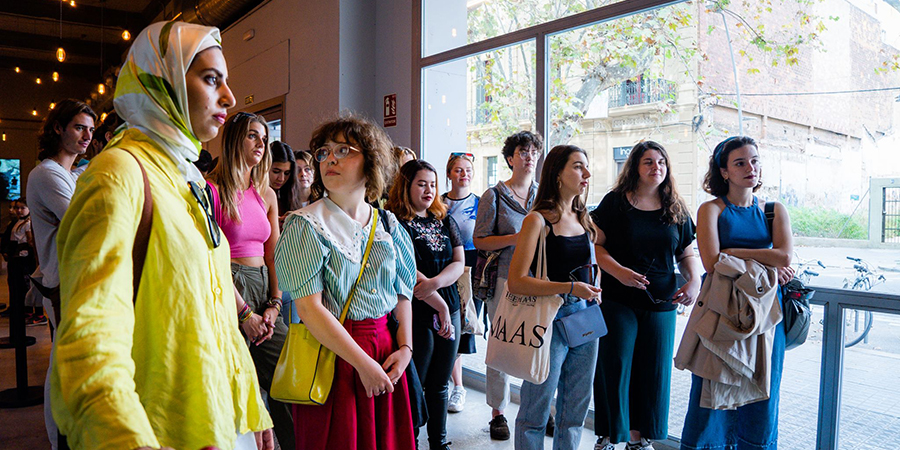- Most viewed
- Last viewed
Christoph Pasour: “Barcelona has more to offer in terms of quality of life and cultural scene than most cities”
The new director of the UIC Barcelona University Master's Degree in Cultural Management, which is part of the Faculty of Humanities, takes on the position after ten years as a degree lecturer and a fruitful career in the cultural sector in Germany. Pasour approaches this new challenge with enthusiasm and mostly with responsibility.
What motived you take the position as director of the University Master’s Degree in Cultural Management at UIC Barcelona?
Being the new master's programme director is a real privilege for me. First, because I know the master's programme, as I have had the opportunity to teach here for more than ten years. This means that the students, their questions, concerns and expectations are very familiar to me. Second, it is an opportunity and a challenge to take on this position after more than 15 years in the audiovisual sector, mainly in Germany and for German companies, because our students expect this master's degree to build the bridge between theory, on the one hand, and the practical application of their acquired knowledge, on the other. And this connection between university and practical experience in the cultural and creative industries is part of my professional profile. That is why I have always felt comfortable working in this master's programme from the beginning, and I think it is good must-have experience for future challenges.
What are the challenges facing the degree after more than 20 years?
I believe that the challenge for us is to find the right balance between continuity and the necessary changes. We have many strong points that have made the master's degree a benchmark in the cultural sector over the past two decades, but we also notice that students are changing. Compared to the situation just a few years ago, they now have different experiences and expectations, and we have to take this into account.
All this added to a changing cultural sector.
Totally changing, partly also due to constant technological innovations, and in turn, the cultural manager role is also in a process of constant change. Furthermore, there are new cultural managers training programmes in many parts of the world. These programmes can be potential partners, but they can also become competitors, and, in a world where we seem to be facing an uncertain future, it is hard to know where our future students will be coming from.
In a master's degree with students of more than 25 nationalities, what does this interculturality offer in the classroom?
Interculturality is an asset for every class discussion and conversation between students and teachers. For us, intercultural exchange is not only an intellectual enrichment, but is also a reality that we experience in the classroom every day. In this sense, our master's degree offers a unique experience for students.
But interculturality can also be a challenge for teachers and the master's degree team.
With so many students of different nationalities, inevitably world conflicts sometimes find their way into the classroom. Mutual understanding between students is vital and this takes time. This is why the master's team at times has to really get involved in the lives and concerns of students and make each one feel at home. We take responsibility for each student, and this is not found in other larger universities. Even so, what always gives me confidence is that in the end, culture is what pulls us together here in Barcelona. Culture is often used, or better said, misused to build barriers. In this master's degree we see how culture can help build bridges.

UIC Barcelona's Master's Degree in Cultural Management is a benchmark in the sector. What sets us apart from the rest?
There are a few indicators that currently make us different and that have also made us strong in the past. Barcelona was and continues to be very attractive to students because they understand that our master's degree is not only an intense year of learning, but a year full of experiences, an extraordinary year of their life. Our city has more to offer in terms of quality of life and cultural scene than most cities.
The master's degree programme is also bilingual, in Spanish and English.
That’s right. This it is another strong point of our degree, although it is sometimes hard to offer a master's degree programme in the English in the cultural sector in Spain. However, teaching in English, combined with the appeal of our city, attracts international, multilingual and highly talented students who are passionate about culture.
How well do these master's degree students meet the market expectations?
What we see and the feedback we receive from companies or collaborators is that our students have very interesting profiles for institutions in the cultural and creative industries. In this sense, our teachers and the entire master's team are doing an excellent job helping students develop this potential and start a successful career. All of these students undoubtedly have the potential to work on the national and international cultural scene, moving freely between sectors, countries, cultures and languages.
They are well prepared coming out of the master's degree programme, ready to start or continue a great career.
But it's not just about having a career. We don't have to reduce culture to the idea of success, efficiency and reputation. We also have to consider other values in culture. The interculturality we have already discussed becomes an experience for our students that can become life-changing. It allows them to return to their home countries with a deeper understanding of what we all ultimately have in common, regardless of where we come from. Given the current situation in our world, this could be the most important thing we can offer.